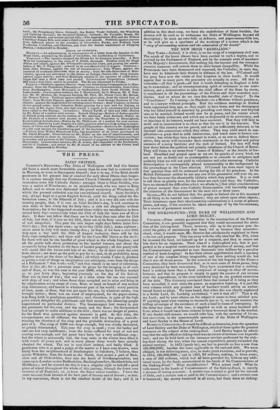THE NEW IRISH " REBELLION."
NEW TIMES—Ireland, it is clear, is on the verge of a sanguinary civil war. The minds of the lower classes have been excited to such a degree, and so excited by the Parliament of England, and by the example even of members of his Majesty's Government, that nothing but the bayonet and the strongest coercive measures will restore them to their former tranquillity. While the Protestants have been denounced and aspersed, the Catholics, in open day, have met to fulminate their threats in defiance of the law. O'Connell and his gang have now the whole of that kingdom in their hands. It would appear that in many parts the peasantry are actually in arms. All that is venerable—all that is good—all that is worth defending in England is held up to execration; and an uncompromising spirit of resistance to our insti- tutions, and a determination to take the chief offices of the State by storm, is manifested in all the proceedings of the Priests and their wretched aux- iliaries. And to whom do we owe this dreadful state of things ? To the "Conciliators." To Canning—to Plunkett—to a Minister without prudence, and to a lawyer without principle. Had time seditious meetings in Dublin been suppressed long ago, as they ought to have been, and the demagogue who has lifted himself to notoriety by presiding over them, been sent beyond seas as he merited, Ireland would now be at peace, and the scenes which we have lately witnessed, and which are so disgraceful to its aristocracy, and so injurious to its interest, would not have occurred. That they will lead to strife and to insurrection is as clear as that the sun is in the heavens. The people of this country are too proud, and not yet sufficiently debased, to be alarmed into concessions which they abhor. They may yield much to sup- plication—a great deal to mild intercession, and much more to honest con- viction ; but while they have a bayonet to wield, or an arm to defend them- selves, they never will surrender their sentiments to the insolent and paltry menaces of a noisy barrister and the mob of Ireland. Far less will they bow down before the political and priestly subalterns of the Church of Rome. They will listen to no terms from " James of Kildare," or the Jesuits of Ire- land. Humbled and preyed upon as we are by quacks of every kind, we are not yet so feeble nor so contemptible as to concede to arrogance and audacity what we will not yield to solicitation and calm reasoning. Catholic Emancipation is consequently placed immeasurably in the background by the proceedings at the Clare election. O'Connell has done more injury to that question than will be redressed during the life of his grandson. In the British Parliament neither he nor any one of his generation will ever sit, un- less they forswear the abominable idolatry which they profess. It is as well to tell them so plainly now, for the times are such (and they, the Catholics, have accelerated the difficulties which we allude to,) that other considerations of graver moment than even Catholic Emancipation will inevitably engage the attention of the Government for the next two or three years.
Gi.oet.—We do not believe that the people in Ireland are at this momen t at all likely to be hurried into violence ; they are intent upon other objects. Their intentness upon their electioneering combinations is a cause of present peace, arid may, if the occasion be taken advantage of by the Government, be a source of permanent security.


















 Previous page
Previous page